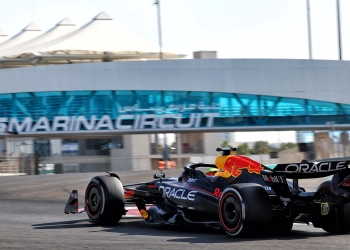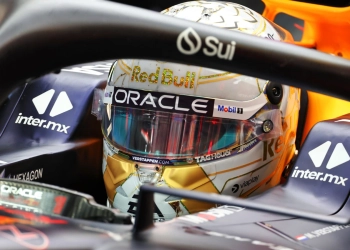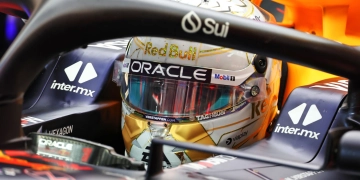Formula 1 team bosses have urged the sport to commit to a long-term solution instead of implementing continuous changes in a bid to improve the Sprint race format.
The Sprint alteration was introduced in 2021 as a means to enhance select grand prix weekends, but substantial tweaks have been made in the intervening years amid criticism.
Last season F1 elected to double the number of Sprint events from three to six and extended the points positions down from only the first three to include the top eight.
Further changes followed this year with the introduction of a second qualifying session, titled Sprint Shootout, in place of FP2, to separate Sprint sessions from the grand prix.
But the revised schedule has continued to divide opinion following a series of drab events that revealed the performance trends of the cars prior to Sunday’s main encounter.
During the Abu Dhabi Grand Prix weekend it was announced that the F1 Commission had granted its approval for more modifications to be submitted ahead of next season.
Red Bull Team Principal Christian Horner, who previously touted the addition of reverse grid races, insists that any refinements must be applied with a long-term mindset in place.
“This is where you’ve got to do the research,” Horner said. “I think it’s very important that the next step that we make is one that is fixed for a long period of time.
“This Sprint concept is a new concept that’s been introduced. And in some areas it’s very popular and with some traditionalists, it’s very unpopular.”
Among those most strongly opposed to the format is reigning champion Max Verstappen, who expressed that he gets “no satisfaction” from winning a Sprint race.
The Dutchman’s view on the configuration was shared by spectators, with an online survey from the FIA in late 2021 detailing that many fans were against the idea.
Therefore, with Sprint races set to remain a fixture on the F1 calendar, Horner has urged the series to take on the consideration of fans with any proposals intended from 2024.
“Whatever it evolves to needs to be consistent for a long period of time,” he reiterated.
“The fan feedback is going to play a crucial role in this, in terms of what is it actually that the audience want? Do they actually enjoy the Sprint format as it is? Or do they actually want to see a bit more racing if we’re going to do a Sprint race?
“If so, if we’re going to do that, then how do we award the points? How do we incentivise drivers and teams? So there are many topics attached to it. But the most important, fundamental thing is, what do the fans want?”

McLaren’s Andrea Stella concurred with Horner that F1 must avoid committing to wholesale changes every winter to enable any revisions to be thoroughly assessed.
“There are positives in the Sprint events,” Stella began. “We also need to give the time to absorb some different ways of interpreting Formula 1 race weekends.
“And we need to make sure that we don’t change too often, too rapidly, because then we wouldn’t have this time to adapt, absorb to a certain way in which we intend a Formula 1 race weekend.
“And this is why we think that while improvements have to be made, they should be relatively incremental, have a few more Sprint races, and then we can have better data, better information to see in which direction the business of Formula 1 should go.”
Aside from the racing aspect, the format came under intense scrutiny at last month’s United States GP after Charles Leclerc and Lewis Hamilton’s post-race disqualifications.
Mercedes claimed parc ferme restrictions on the Sprint weekend contributed to the squad being unable to discover that its set-up would wear the plank beyond the mandated amount across a race distance on the bumpy Circuit of the Americas track surface.
With the F1 Commission noting its support for amendments to parc ferme conditions, Aston Martin chief Mike Krack has approved plans to rejig the schedule of sessions.
“I fully agree on what Christian and Andrea just mentioned – not shooting too quickly after a couple of races, small changes, or small adjustments, step by step,” he added.
“I think the sequence of sessions is already a change that we have to see how it pans out. It will have also other consequences or other implications.
“And then the most important, and that is a point that Christian made, which I think is very, very important is what do the fans want? Because we do it for them. And this has to be taken carefully into consideration. But also, when doing changes, think about the implications and not trying to fix something again two races later.”










Or to put it another way, the culture of the FIA is to make reactive changes to perceived issues, rather than a detailed, fact based review considering many options and making decisions based on a framework of criteria.
This isn’t just sprint format, but also rule changes and enforcement, and even technical changes.
The management of change is a well researched subject in many areas. In particular Major Hazard Industries, where principles and frameworks are well laid out and developed in aviation, mining, transport, chemical, etc and enshrined in published codes & standards and standards and consultancies such as ISO Management Standards.
Strangely FIA is certified under Environmental Management Standards ISO1400. So the culture should not be alien to them !!
I want to publish my article on your site.